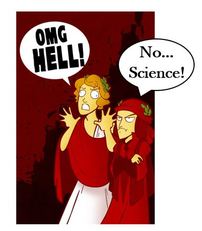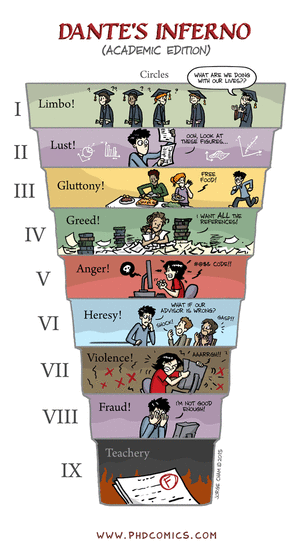|
by Michelle Muzzio, 2nd Year Chemistry PhD Student If you are reading this thinking about the new film based on Dan Brown’s book Inferno, I am sorry, but you’re in the wrong place. However, if you’re instead thinking about the first part of Dante’s Divine Comedy in which Brown’s Inferno is loosely (and I mean loosely) based on, then get ready to go to hell… at least scientifically.
So what does a poem concerned with perfect meter and vivid symbolism have to do with gravity, astronomy, and modern physics? Perhaps Dante himself can help us answer this question. “Slowly, slowly it [Geryon] swam and took its course wheeling, descending, as I could not tell but for the breeze below, and on my cheek” Canto XVII, Lines 115-117 In this, Dante the narrator is explaining his descent between circles on the back of Geryon, a monster of fraud. “Wheeling” suggests a rotational descent on the back of the monster, and yet Dante the narrator can feel nothing but a breeze coming from below. Virgil explains lines earlier that Geryon should take his descent slowly, and keep the turns wide – keeping in mind Dante the narrator is now on his back. Dante the author has the unique sense of what can probably be described today as inertia and centrifugal force, two terms that were not coined until much later during Newton’s age. This argument was actually discussed with more detail in a Nature paper by Italian physicist, Leonardo Ricci, in 2005.
Moral of the story: if any of your friends in science argue that the humanities don’t matter, just tell them that the connection between the two brought forth a Nature paper for crying out loud! All joking aside, if Galileo found some use reading Dante's Inferno, perhaps then today's scientists might as well. Or perhaps "Frankenstein", "Do Androids Dream of Electric Sheep?", and perhaps even Shakespeare.
0 Comments
Leave a Reply. |


